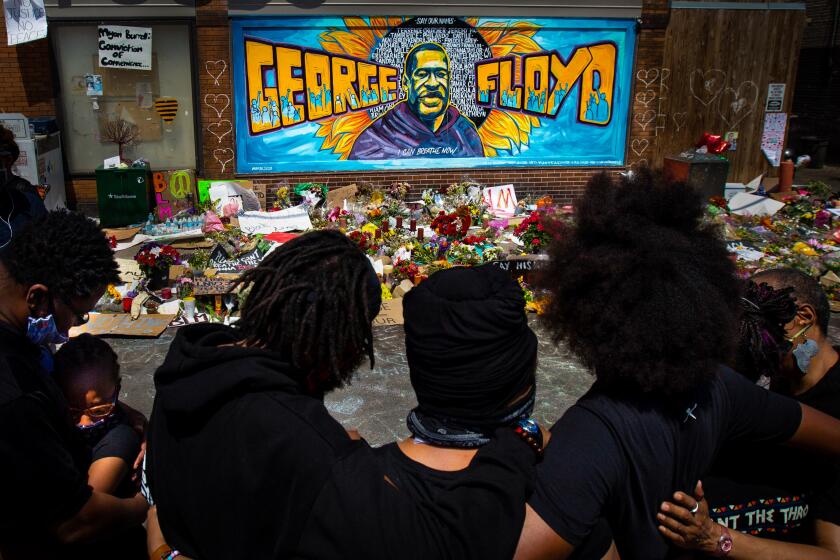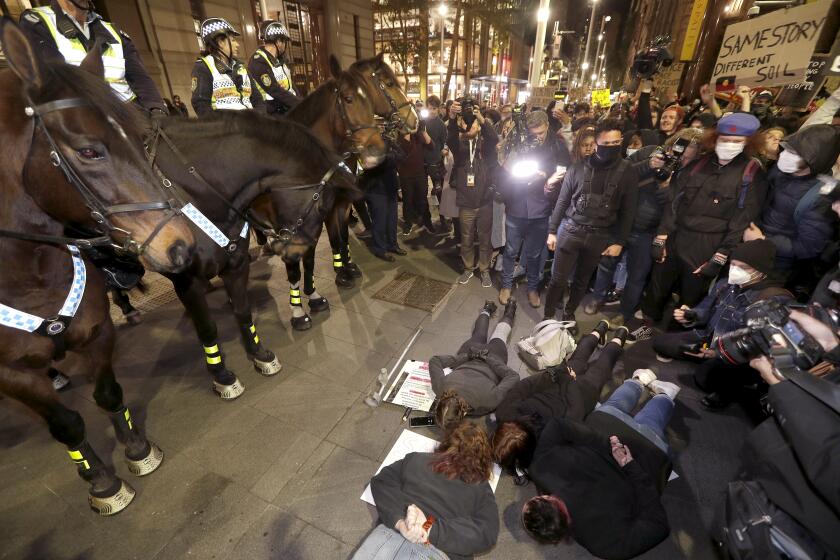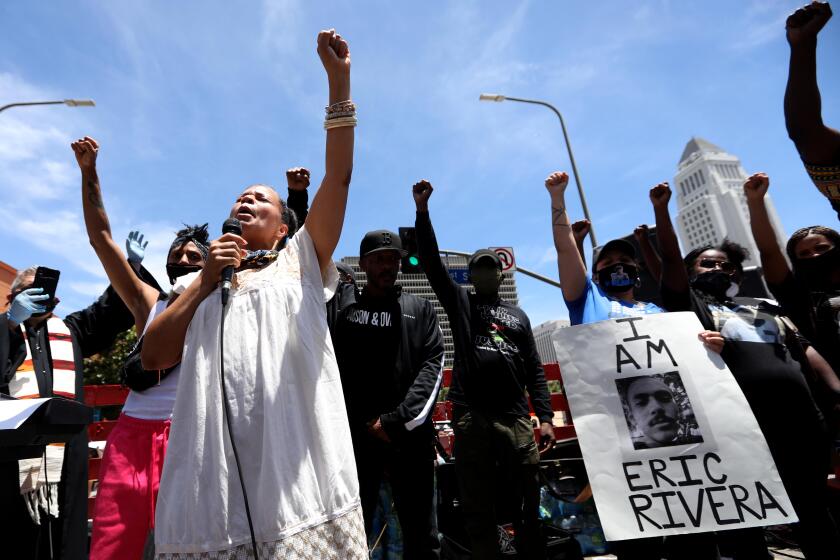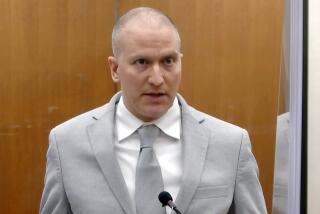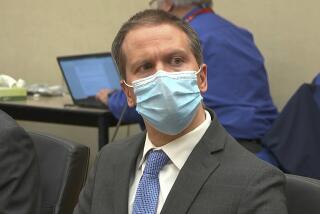Death of George Floyd, trial of Derek Chauvin: Timeline of key events
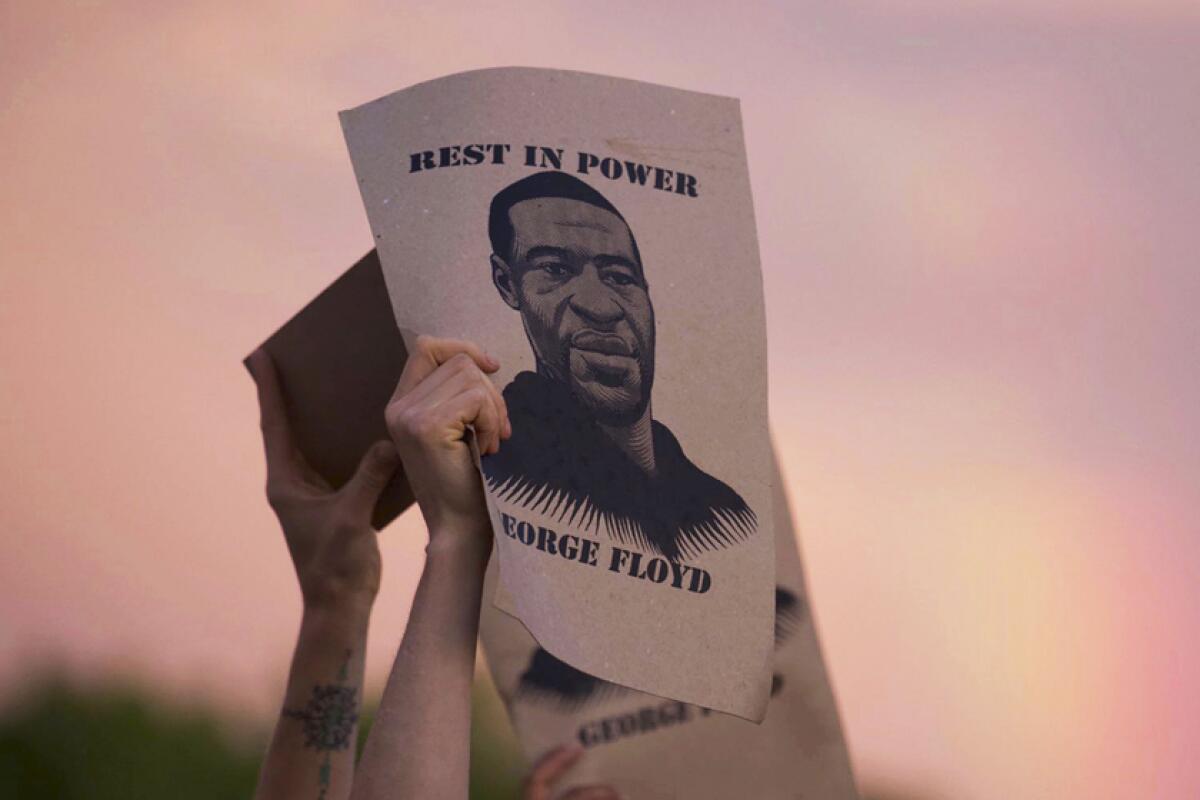
- Share via
MINNEAPOLIS — George Floyd’s death in police custody in Minneapolis on May 25, 2020, touched off a nationwide reckoning on race and led to the trial of ex-officer Derek Chauvin. Here’s a timeline of key events:
May 25, 2020: Minneapolis police officers respond to a call shortly after 8 p.m. about a possible counterfeit $20 bill being used at a corner grocery and encounter a Black man, later identified as Floyd, who struggles and ends up handcuffed and facedown on the ground. Chauvin uses his knee to pin Floyd’s neck for about nine minutes while bystanders shout at him to stop. Bystander video shows Floyd crying, “I can’t breathe,” multiple times before going limp. He’s pronounced dead at a hospital.
May 26: Police issue a statement saying that Floyd died after a “medical incident” and that he physically resisted and appeared to be in medical distress. Minutes later, bystander video is posted online. Police release another statement saying the FBI will help investigate. Chauvin and three other officers — Thomas Lane, J. Kueng and Tou Thao — are fired. Protests begin.
May 27: Minneapolis Mayor Jacob Frey calls for criminal charges against Chauvin. Protests lead to unrest in Minneapolis, with some people burglarizing and starting fires. Protests spread to other cities.
May 28: Minnesota Gov. Tim Walz activates the Minnesota National Guard. Police abandon the 3rd Precinct station as protesters overtake it and set it on fire.
May 29: Chauvin is arrested and charged with third-degree murder and manslaughter. Then-President Trump tweets about “thugs” in Minneapolis protests and warns: “When the looting starts, the shooting starts.” Protests turn violent again in Minneapolis and elsewhere.
It’s a club no one wants to join. These Black families have lost loved ones to police brutality. The Chauvin trial could bring justice.
May 30: Trump tries to walk back his tweet. Protests continue nationwide, and some turn violent.
May 31: Walz says state Atty. Gen. Keith Ellison will lead prosecutions in Floyd’s death. The nationwide protests continue.
June 1: The county medical examiner finds that Floyd’s heart stopped as police restrained him and compressed his neck, noting that Floyd had underlying health issues and listing fentanyl and methamphetamine use as “other significant conditions.”
June 2: Minnesota’s Department of Human Rights launches a civil rights investigation into the Minneapolis Police Department.
June 3: Ellison files a tougher second-degree murder charge against Chauvin and charges the other three officers who were involved in Floyd’s arrest.
June 4: A funeral service for Floyd is held in Minneapolis.
June 5: Minneapolis bans chokeholds by police, the first of many changes to be announced in coming months, including an overhaul of the police department’s use-of-force policy.
U.S. protests over George Floyd’s death have galvanized movements against racism, police brutality and inequalities in other liberal democracies.
June 6: Massive, peaceful protests happen nationwide to demand police reform. Services are held for Floyd in Raeford, N.C., near his birthplace.
June 7: A majority of Minneapolis City Council members say they support dismantling the police department. The idea later stalls but sparks a national debate over police reform.
June 8: Thousands pay their respects to Floyd in Houston, where he grew up. He’s buried the next day.
June 10: Floyd’s brother testifies before the House Judiciary Committee for police accountability.
June 16: Trump signs an executive order to encourage better police practices and establish a database to track officers with excessive use-of-force complaints.
July 15: Floyd’s family sues Minneapolis and the four former officers.
With Melina Abdullah and Patrisse Cullors playing key roles, Black Lives Matter has transformed from a small but passionate movement into a cultural and political phenomenon.
July 21: The Minnesota Legislature passes a broad slate of police accountability measures that include bans on neck restraints, chokeholds and so-called warrior-style training.
Oct. 7: Chauvin posts $1-million bond and is released from state prison, sparking more protests.
Nov. 5: Hennepin County Judge Peter Cahill rejects defense requests to move the officers’ trials.
Jan. 12, 2021: Cahill rules Chauvin will be tried alone because of courtroom capacity issues. The other officers will be tried in August.
Feb. 12: City leaders say George Floyd Square, the intersection blocked by barricades since Floyd’s death, will reopen to traffic after Chauvin’s trial.
March 9 : The first potential jurors are questioned for Chauvin’s trial after a day’s delay for pretrial motions.
News Alerts
Get breaking news, investigations, analysis and more signature journalism from the Los Angeles Times in your inbox.
You may occasionally receive promotional content from the Los Angeles Times.
March 12: Minneapolis agrees to pay $27-million settlement to Floyd family.
March 19: Judge declines to delay or move the trial over concerns that the settlement could taint the jury pool.
March 23: Jury selection completed with 12 jurors and three alternates.
March 29: Opening statements are given.
April 11: Daunte Wright, a 20-year-old Black man, is fatally shot by a white police officer during a traffic stop in Brooklyn Center, a suburb of Minneapolis, sparking successive days of protest.
April 12: Judge declines request to sequester Chauvin jury because of Wright shooting.
Thursday: Testimony ends.
Monday: Closing arguments begin.
More to Read
Sign up for Essential California
The most important California stories and recommendations in your inbox every morning.
You may occasionally receive promotional content from the Los Angeles Times.
